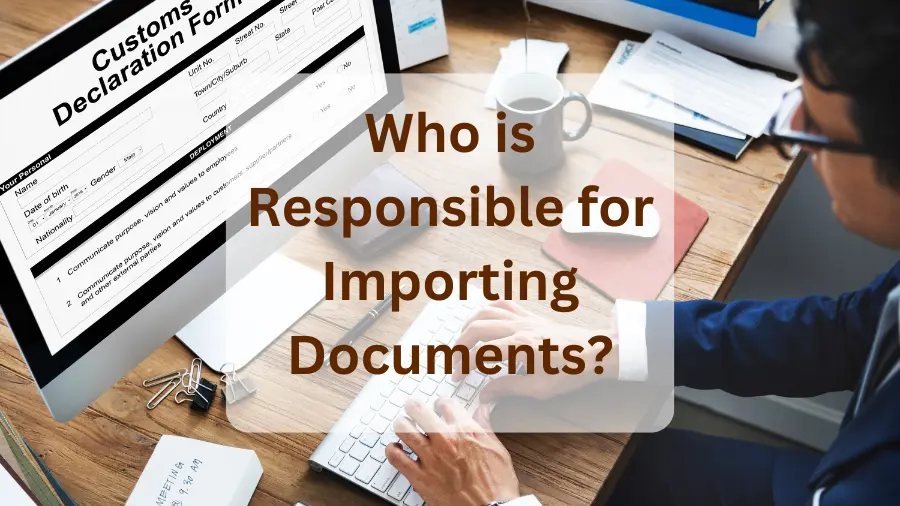Importing goods involves more than just the physical transportation of products; it requires careful management of import documents to ensure smooth customs clearance and compliance. Knowing who is responsible for import documentation is a primary factor in streamlining the process. The IOR holds the ultimate responsibility for ensuring that all required documents—such as commercial invoices, packing lists, and bills of lading—are accurately submitted to customs authorities. However, other key players, including customs brokers, freight forwarders, and exporters, also contribute to managing specific aspects of the documentation process.
In this comprehensive guide, we’ll break down each party’s responsibilities, provide an essential import document checklist, and offer expert tips to help you navigate the import process efficiently and compliantly. Let’s get started!
Who is Responsible for Importing Documents?
The responsibility for importing documents is shared among various parties, with the Importer of Record holding the primary accountability. Below is a breakdown of each party’s role in the process:
Importer of Record (IOR)
The IOR is ultimately responsible for ensuring that all required import documentation is accurately submitted to customs authorities. This includes compiling and providing documents such as commercial invoices, packing lists, bills of lading, and certificates of origin. The IOR is also accountable for the payment of all associated duties, taxes, and fees. Understanding why businesses need an IOR?
Customs Brokers
Customs brokers are licensed professionals who facilitate the clearance of goods through customs and ensure compliance with relevant regulations. The brokers assist the IOR by preparing and submitting the required documents to customs authorities, including handling specific tasks related to customs clearance and regulatory compliance.
Freight Forwarders
Freight forwarders are responsible for organizing the transportation of goods. They manage transportation-related documentation, such as shipping manifests and bills of lading, which are required for customs clearance.
Exporters
Exporters provide essential documentation, including commercial invoices, packing lists, and certificates of origin. These documents are critical for ensuring compliance with customs regulations and facilitating smooth customs clearance.
Import Document Checklist
While import documentation requirements can differ based on the type of goods, their country of origin, and the destination country, there are several key documents typically needed for most imports. This section outlines these essential documents, explaining their purpose and importance in the import process.
Bill of Lading
The Bill of Lading is a legal document that serves as both a receipt for the goods and a contract between the carrier (the company transporting the goods) and the shipper (the seller). It includes details like the type, quantity, and destination of the goods. This document is required for every shipment and helps track and confirm the movement of goods. Check the BoL requirements for global trade
Proforma Invoice:
The Proforma Invoice is a preliminary version of the invoice sent to the importer before the shipment arrives. It lists details about the goods, including their description, quantity, unit prices, and total value. Although it is not legally binding, customs officials need to estimate duties and taxes.
Shipper’s Letter of Instructions (SLI):
The Shipper’s Letter of Instructions (SLI) is a document the exporter provides to the carrier (shipper). It gives special instructions regarding how the goods should be handled, delivered, or cleared through customs. This document is optional but can help ensure smooth processing of the shipment.
Certificate of Origin:
The Certificate of Origin is used to confirm the country where the goods were made. This document is particularly useful if the importer is looking to take advantage of benefits under free trade agreements, which may reduce or eliminate tariffs. It proves the origin of the goods, which can save costs and speed up the import process.
Packing List:
The Packing List is a detailed document that lists the contents of each package or shipment. Customs authorities need to verify what is being imported, ensure proper handling, and check for any specific regulatory requirements. Learn how to create error-free packing lists.
Commercial Invoice:
The Commercial Invoice is one of the most important documents in the import process. It provides detailed information about the shipment, including the breakdown of charges, the value of the goods, and the country of origin. This invoice helps customs classify and value the goods correctly, ensuring smooth clearance at the port of entry. A well-prepared commercial invoice helps prevent delays and additional costs. Explore the customs invoice requirements
Streamline Your Import Process with Expert Guidance
Take control of your import process with confidence! Our experienced team is here to simplify the complexities of import documentation. With our Expert guidance for import documentation, you can rest assured that every detail—from compliance to accuracy—is managed seamlessly. Let us provide the support you need at every step of your journey.
Fill out the form to get expert assistance in managing your import documentation and ensuring smooth customs clearance. Simplify your import process today—submit your inquiry now and let us help you get started!

